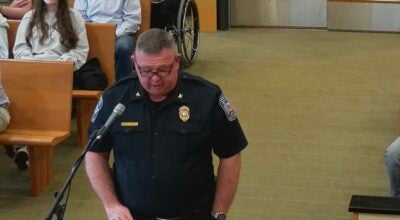Bill would allow medical cannabis in nursing homes
Published 6:00 am Friday, February 28, 2020
|
Getting your Trinity Audio player ready...
|
By Chip Lauterbach
Capital News Service
Virginia lawmakers continue to fine tune legislation that aligns with the state’s growing medical cannabis program by advancing two Senate bills facilitating the work of caregivers and lab employees.
SB 185 sponsored by Sen. Siobhan Dunnavant, R-Henrico, would allow employees at nursing homes, assisted living facilities and hospices to administer CBD and THC-A oil to residents who have a valid written certification to use the medication. SB 885 from Sen. David W. Marsden, D-Fairfax, would remove criminal liabilities for analytical lab workers who transport and possess both substances during the course of their work.
Marsden also introduced legislation to protect individuals from possession charges for having marijuana in the form of cannabidiol oil or THC-A oil, if they have valid written certification from a practitioner.
In 2019, Dunnavant and Marsden helped pass legislation signed by the governor to reduce restrictions for patient access to the substances (SB 1557, SB 1719).
CBD products are used to treat epilepsy and to help with pain management for a variety of ailments. The product can be extracted from hemp, a plant in the cannabis family that is typically low in THC. The non-psychoactive version of THC is THC-A; it does not produce a high. THC-A has been used to treat seizures, arthritis and chronic pain. Fibers of the hemp plant are also used in making rope, clothing, paper and other products. Hemp recently became legal at the federal level, and its cultivation is still regulated.
There is a distinction between hemp-derived CBD oil and marijuana-derived CBD oil, namely the level of THC present.
Dunnavant told a Senate panel the bill is needed so that staff at assisted living facilities can be included as those authorized to store and administer both CBD and THC-A to residents and patients. Registered nurses and licensed practice nurses can legally administer the oils. Last year lawmakers passed legislation protecting school nurses from prosecution for possessing or distributing such oils, in accordance with school board policy.
Several nursing homes and assisted living facilities when contacted said that currently the use of CBD or THC-A are not allowed at their locations and that there are no immediate plans to incorporate such use into the care of their residents or patients.
Marsden sees his bill as an opportunity for further research and development of medical marijuana in Virginia. The state pharmaceutical processors permitted to manufacture and dispense marijuana-derived medications can distribute products with doses that do not exceed 10 milligrams of THC.
“If a laboratory is going to handle a drug that is marijuana, they need immunity from prosecution.” Marsden said. “Even if we go into decriminalization, that still has some civil penalties for it.”
Brion Scott Turner of Richmond is glad steps are being made towards CBD becoming more available. Turner uses CBD to help with his own medical condition.
“I use a CBD-infused lotion for my psoriasis,” Turner said. “It gives me relief from the itching and the psoriatic arthritis that comes with it.
Turner has said that most of his friends and family use CBD to help with a variety of ailments from minor headaches to anxiety attacks.
“My mother uses CBD for anything from lower back pain, helping with an upset stomach or even migraines,” Turner said.
Other cannabis related bills moving through the General Assembly include HB 972, which would decriminalize simple possession of marijuana down to a civil penalty of no more than $25. The Senate version of the bill carries a civil penalty of no more than $50.
HJ 130, currently in the Senate Committee of Rules, would direct the Joint Legislative Audit and Review Commission to study options for the regulation of recreational adult use and medical use of cannabis. SJ 67, which has passed the House and Senate, directs JLARC to study options and make recommendations for how Virginia should go about the growth, sale and possession of marijuana. JLARC’s recommendations are due by July 1, 2022.
Both Dunnavant and Marsden’s bills reported out of committee and are headed to the House floor.




